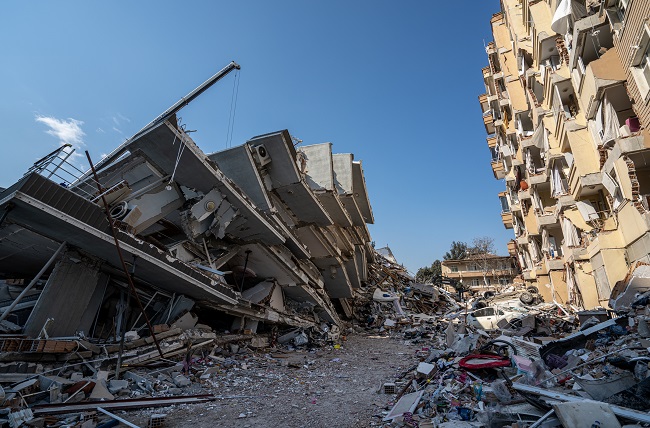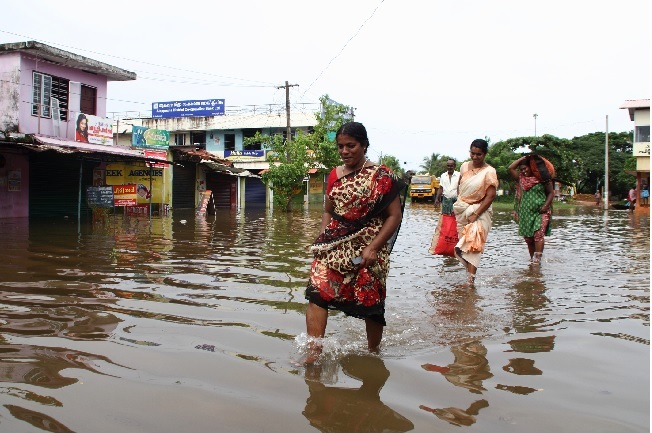Feb 22, 2026
Feb 22, 2026
When will the ground under my feet fritter away? When will the walls of my house cave in? That is the constant fear of the people of Istanbul after the earthquake at the Turkey-Syria border which claimed fifty thousand lives. When it will strike is uncertain; that it will is certain. The historic Turkish metropolis which has been the cradle of many a civilization is in the grip of mortal fear of another devastation.

Earthquake, bhookampam, was no more than a metaphor for me till my late teens. Any shake up, commotion, if it was to be reported in hyperbole, was a bhookampam. The first time I felt it, an experience hard to explain, was in Delhi. A momentary tilt, a subtle swing, a clank in the kitchen--and then it was all over. It was more fun and wonder than fear. Indraprastham, which had witnessed the rise and fall of seven imperial regimes through centuries, was not shaken. What spared Delhi was to hit hard again and again Nepal, a tiny kingdom on the trail of the Himalaya which Kalidasa hailed as the earth’s measuring road.
My blessed state, Kerala, has not had to bear the brunt of disasters, natural or man-made, till a few years ago. It did not have the trauma of a war. Monsoon floods required the rehabilitation of people in low-lying areas. Landslides blocked traffic for a while. But earthquake was an unheard of calamity. Then we started a grand scheme of deforestation, bringing down forest cover from two-thirds to one-third or less. In an obsessive fit of construction, waterbodies, including the sea, were reclaimed and buildings were put up on the newly found land. It was a valiant venture to emulate Parashurama who had reclaimed a large tract of land from the sea to settle his minions. And, as Ayyappa Paniker said, monsoon became half, and half’s half.

The denizens of the land of the Brahman with the axe were slowly introduced to mild tremors, particularly in high ranges, where what may be called a poachers’ paradise flourished. Flash floods became a routine affair, rendering roads into rivers. In a recent calamity, a good part of a village, Kavalappara, vanished into thin air. No one may now come up with the confession that the greenest state of India had not been forewarned. In a famous Elegy for Earth, O N V Kurup bemoaned the disrobing of Mother Earth, forcing her to saunter along the highway of the solar system, insulted, head clean-shaven. The Greek story of the son marrying the mother is old. The new story has Mother Earth’s sons molesting her ecstatically. Addressing her, ONV says “you are not yet dead. Your end is imminent. We will join you.”
Disrobing Mother Earth was not started yesterday. She has suffered too much since the early years of human civilization. She is sarvam saha. In her repository, she has enormous wealth. She is Vasundhara. God had to recreate himself as a boar to rescue her from Hiranyaksha who had abducted to the depths of the ocean. Her inheritors have not yet realized the enormity of their misadventure.
The sages of the Rig Veda had some idea of Earth’s travails. One mantra says: “He who fixed fast and firm the earth that staggered, and set at rest the agitated mountains, Who measured out the air's wide middle region and gave the heaven support, He, men, is Indra.”
Herodotus, arguably father of historiography, has left some clues to what we modernists call the rape of earth. She was always ready with succor to those who needed it. When Sita was down and out, reflecting the indignity inflicted on women down the ages, Mother Earth was there to absorb her in her bosom. It provoked even Rama, our famously equanimous man-god. He threatened to plough earth up and down, inundate it, even remove it from the schedule of five elements that constitute life.
Five years ago, earth erupted in Mexico City. The inheritors of the Mayan culture were not overawed. They have got used to the vicious moods of Mother Earth. My son and daughter, who happened to be there together, had left their hotel a minute before its coffee shop crumbled, of course, burying alive its leisurely patrons without notice. Tsunami is a comparatively new entry in our disaster lexicon. Though we are not endowed with Japanese resolve for recovery, my blessed state has begun to feel the pangs of Mother Earth’s tremors. Something turned in its bowels violently in 1977 and irate Indian Ocean waves sprang up to the crowns of tall, desolate palm trees. While going round Machilipattanam and many wrecked villages on Andhra coast, covering the calamity for All India Radio, I was appalled by the eerie harmony on roadsides where thousands of human and animal bodies lay without protest, awaiting the overworked disposal squads.
Reports from Istanbul are shattering. Hundreds of buildings, houses and offices, in the historic city of Constantinople have been declared unsafe. Scared citizens are unable to decide whether they should abandon their apartments where they have been living for so many years or risk being around as guardians of their endangered city. Most edifices built on specifications of safety, they say, may not withstand another tremor which comes in repetitive ruthlessness. A morbid but persisting, relieving, thought is that it may yet not happen in our little homeland. It may not happen tomorrow but it will a day or two later. Hey man, watch your word and deed. Mother Earth is angry.
Images (c) istock.com
25-Mar-2023
More by : K Govindan Kutty